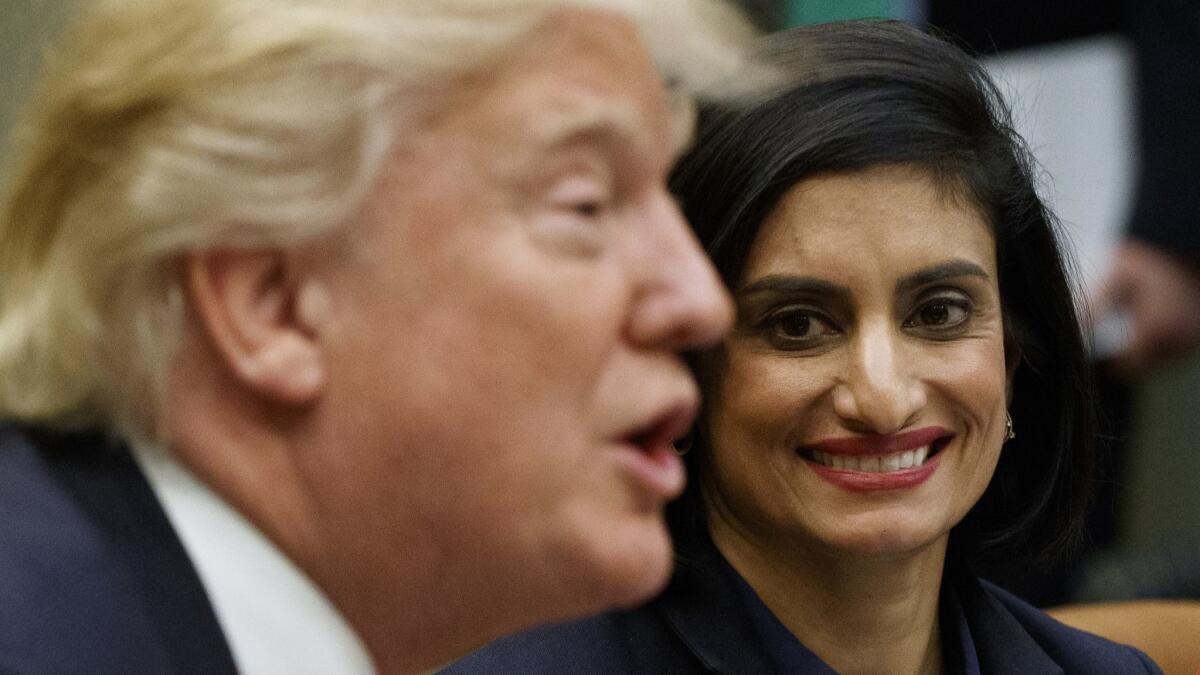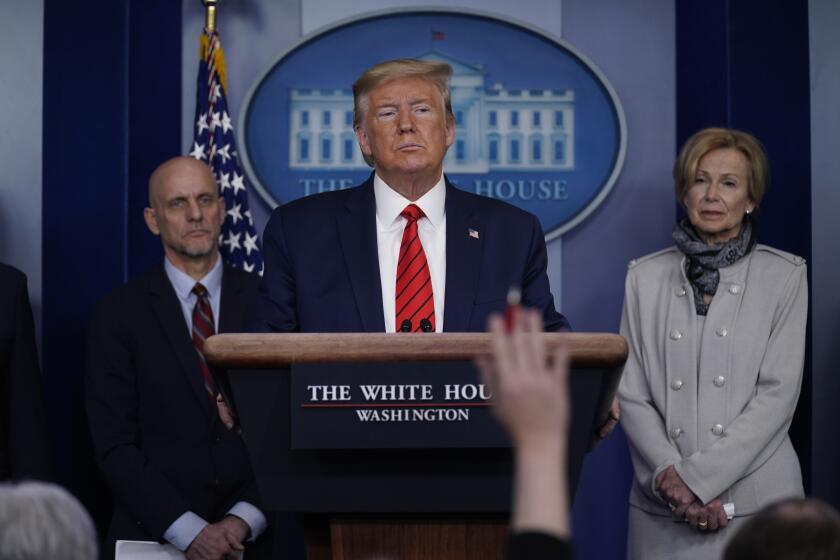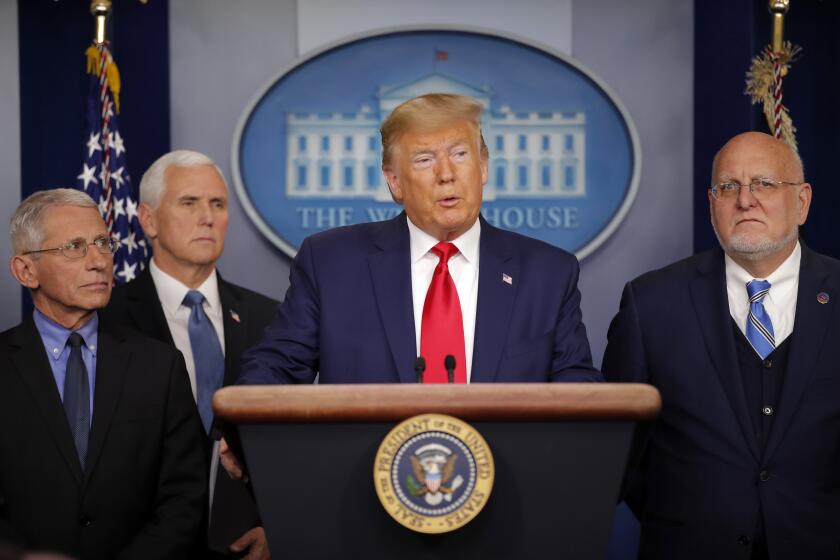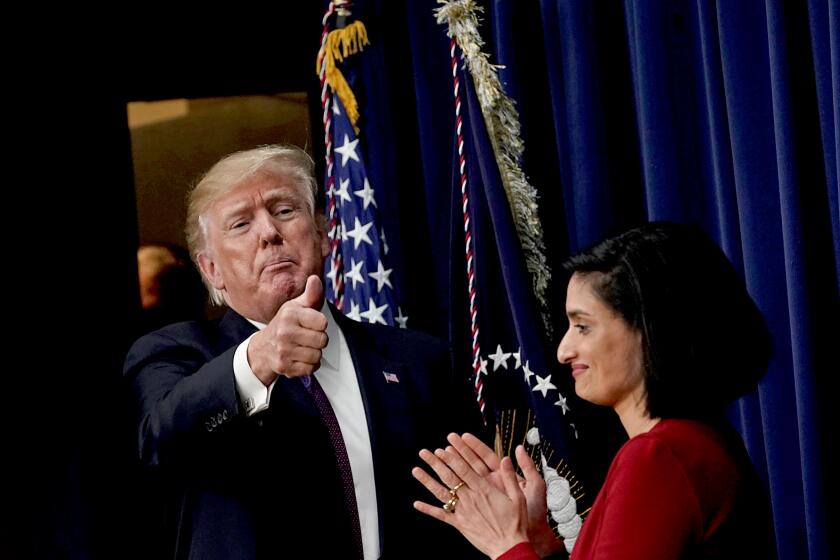Column: How the coronavirus crisis is saving Medicaid from Trump

- Share via
It may seem inappropriate to look for a silver lining in the coronavirus disaster, but nevertheless here’s one that specifically applies to our largest public health program: The crisis has put a hard stop to the Trump administration’s attack on Medicaid.
This has happened in two ways. First, it has brought home even to the most ideologically addled members of the administration or benighted state governments how crucial Medicaid is to the fight against the virus and COVID-19, the disease it causes.
The crisis will drive the costs of treating its victims so high that the budgets of numerous hard-hit states would utterly collapse without the open-ended federal cost-sharing of Medicaid.
FFCRA is a major legislative change to Trump Administration policy of encouraging the deployment of administrative frictions to drive down Medicaid enrollment.
— David Anderson, Duke University
Second, Congress has increased the federal share across the board, while putting a hold on any Medicaid changes that would throw people off the program.
That means no new work requirements, no new premiums, deductibles or co-pays, and no administrative impositions that result in lower enrollment. The ban is part of the second coronavirus response bill, the Families First Coronavirus Response Act or FFCRA, signed by Trump on March 18.
“FFCRA is a major legislative change to Trump administration policy of encouraging the deployment of administrative frictions to drive down Medicaid enrollment,” wrote Duke University health insurance expert David Anderson on Thursday.
In recent days, alarm about the economic impact of the novel coronavirus have turned conservatives who weeks ago were boasting about the shrinking of the U.S. government into raving Keynesians, proclaiming the virtues of deficit-financed economic stimulus.
Meanwhile, the Trump administration has withdrawn a proposed rule that would have tightened Medicaid eligibility, his most aggressive attempt ever to gut a program that covers more than 70 million low-income Americans.
The measure increases the federal share of traditional Medicaid spending for all states by 6.2 percentage points for the duration of the emergency. That share has ranged from 77.76% for Mississippi to the statutory minimum of 50% for 13 states, including New York and California. In other words, the minimum federal share will rise to 56.2%, and Mississippi will get 83.96%.
To receive the bump-up in reimbursement, states have to commit to several actions, as set forth in a fact sheet issued by the government’s Centers for Medicare and Medicaid Services, or CMS.
They have to cover all “testing, services and treatments — including vaccines, specialized equipment, and therapies — related to COVID-19, according to the CMS fact sheet.
They may not impose eligibility standards or procedures that are more restrictive than what they had in place as of Jan. 1 (maintenance of effort requirement). Nor can they raise premiums higher than those in effect on Jan. 1.
And they may not disenroll anyone who was on Medicaid as of March 18. The exceptions are enrollees who voluntarily ask for disenrollment, or those who have left the state.
The bump-up in the federal share and the associated rules will last through the end of the quarter in which the coronavirus emergency is declared over, whenever that happens.
The $2-trillion stimulus bill passed by the Senate on Wednesday and awaiting virtually certain passage by the House on Friday also has a Medicaid-friendly provision — or at least averted a Medicaid-unfriendly action. As detailed by Greg Sargent of the Washington Post, congressional negotiators dropped a proposal that would have barred small business assistance for nonprofits that receive Medicaid funding.
At stake was access to the bill’s $350 billion in small business loans, which can be forgiven if the recipients keep their workers on the payroll.
The coronavirus shows why Trump’s healthcare policies are dangerous for all
The provision’s target was Planned Parenthood, but as Sargent observes it would have swept in home and community-based disability services providers; community-based nursing homes and rape crisis centers, among other healthcare providers. Now they’re eligible for help like other small businesses, and their employees get another dose of economic protection.
It isn’t certain that every state will make the commitment necessary to receive the 6.2-percentage-point increase in the federal Medicaid share. After all, 14 Republican-led states are still stupid enough to refuse Medicaid expansion under the Affordable Care Act, which provided for a federal match that started at 100% and is 90% now and in future years.
Some of those states are contemplating accepting the expansion, but only if they can impose premiums and work requirements on the target population. Both provisions are known to reduce enrollment and risk throwing enrollees out of the program by the tens of thousands.
Oklahoma, for example, rolled out such a plan for Medicaid expansion last week, in the teeth of the crisis. As Oklahoma Watch reports, the state’s own experts project that the program would serve thousands of residents fewer than a traditional expansion.
The plan proposed by Republican Gov. Kevin Stitt would require some premiums and co-pays. It would also impose work requirements, which have been shown neither to improve enrollees’ health nor help them find employment.
The latest effort to gut Medicaid is Trump at his most dangerous.
Oklahoma rationalized its work requirements by citing a 2016 study of a similar program in Indiana that suggested that having Medicaid enrollees there pay premiums resulted in better health outcomes. In fact, the study made no such finding.
The congressional recognition of Medicaid’s importance in the current crisis is a reproach to the Trump administration, which under Medicaid chief Seema Verma has been moving heaven and earth to undercut the program. The administration has offered wholesale approvals of work requirements, despite evidence they suppress enrollment and don’t increase employment, and have been blocked in federal court to boot.
The administration also has invited states to convert their Medicaid programs to block grants, with the come-on that states that spend less than their block-granted amount will be permitted to keep some of the savings. On the other hand, those that exceed the block-grant sum will be on the hook for the entire excess.
It’s been plain before now that accepting this deal would be an act of insanity for any state, since it would eliminate the flexibility of spending under the existing open-ended Medicaid reimbursement system. If you need another horror story in this parlous period, try to imagine what that would do to a state budget when COVID-19 arrives within its borders.
More to Read
Inside the business of entertainment
The Wide Shot brings you news, analysis and insights on everything from streaming wars to production — and what it all means for the future.
You may occasionally receive promotional content from the Los Angeles Times.














